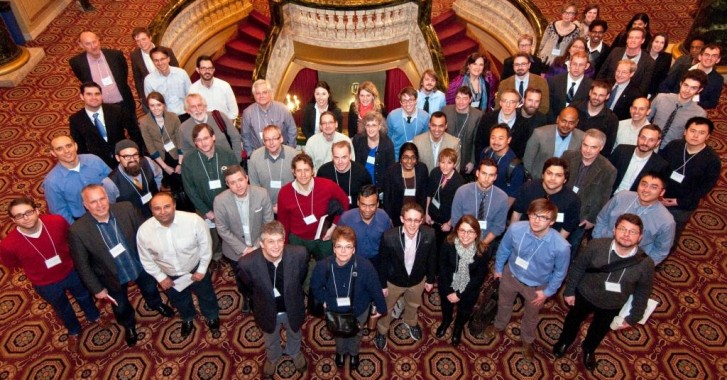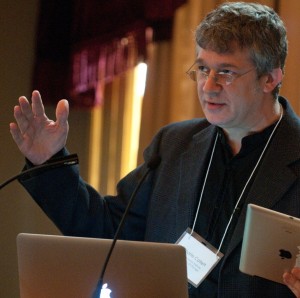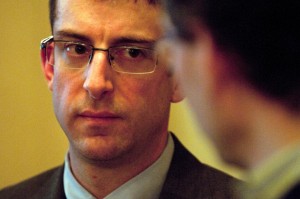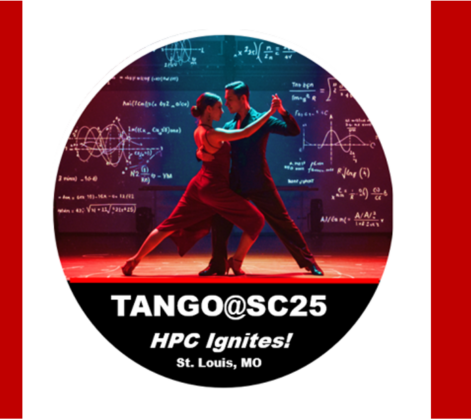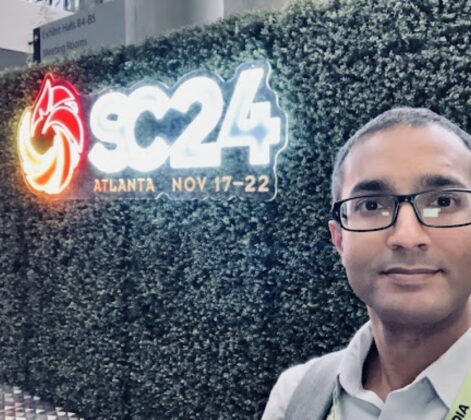Photography by Lloyd DeGrane
The Urban Center for Computation and Data (UrbanCCD) and the University of Chicago Urban Network hosted an interdisciplinary workshop at the School of the Art Institute of Chicago on Friday, February 15. Participants from a variety of research domains, organizations, and regions discussed ways that collaborative research teams could use public and private sector urban data including a growing collection of city data being published through the transparency initiatives of Chicago Mayor Rahm Emanuel. The event was a remarkable confluence of social and computational science that produced rich, cross-cultural discourse about urban issues of extreme importance to society.
UrbanCCD Director Charlie Catlett, Senior Fellow at the Computation Institute (a joint initiative of the University of Chicago and Argonne National Laboratory) and Argonne Senior Computer Scientist welcomed the group. He asked attendees to think of the day as a ‘kickoff’ of a multidisciplinary, multi-institutional research network aimed at exploring ways to leverage open data, shape public policy, and ultimately improve the quality urban life around the world.
Chicago’s Department of Innovation and Technology Commissioner and Chief Data Officer, Brett Goldstein, presented the keynote address. With seven years of experience building the now-ubiquitous start-up OpenTable, and dual master’s degrees in computational science and criminal justice, Brett Goldstein is well qualified to have designed Chicago’s data portal and framework.
Goldstein described underlying problems with the way data is often managed in large cities. Much is trapped at the department level on paper or unreadable fax and PDF file formats. As with many large enterprises, cities rely on expensive technology solutions that can take years to implement, aren’t scalable, and don’t readily support sharing. He knew it would be necessary to rethink business procedures beginning at the ground level. Chicago needed an enterprise-wide, open-source solution that hooked into all facets of city government so that data could be analyzed, shared, and managed for the future.
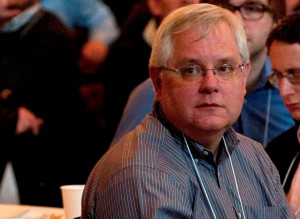
UC Economics Professor Derek Neal conducts research in labor, racial wage inequity, and education policy.
Mayor Rahm Emanuel, after running on a platform that included transparency and open data, created the CDO position and appointed Goldstein. Twenty months later, Emanuel signed an executive order to further increase the utility of Chicago’s Open Data Portal, making open data a city policy and creating open data coordinator roles for each city department.
In preparation for the 2012 NATO summit, Goldstein’s team created WindyGrid, an open-source analytics platform based on MongoDB, borrowing much of the architecture from social network platforms such as FourSquare. WindyGrid helps city leaders make decisions by providing real-time and historic information by city location. It draws from city-wide data sources and available public information, such as 311 and social media platforms.
The next iteration, SmartData Platform, will include more data and enhancements. UrbanCCD (with scientists from Argonne National Laboratory and the University of Chicago) will work with Carnegie Melon University’s Event Pattern and Detection Laboratory, and the Chicago Smart Collaborative to develop SmartData’s publicly-accessible framework. (Update: On March 13 it was announced that the project was selected from among 20 finalists in the Bloomberg Philanthropies’ Mayors Challenge to receive $1 million to support the development and implementation of the new platform over the next few years).
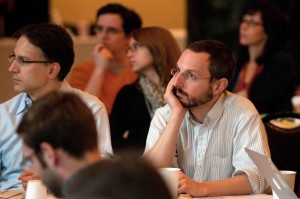
Computational Scientists Svetlozar Nestorov (left) and Jonathan Ozik are with the Computation Institute.
Following the keynote address, attendees divided into ten focus groups for the balance of the day. Topics included: neighborhood socio-economic vitality indexes; high school and college graduation rates; crime/juvenile offenders (location/demographics); data and metadata; economic shocks; access to community assets and resources; employment/labor supply/demand; education/integration; energy consumption; and transportation. The discussions were organized to explore interdisciplinary research ideas leveraging urban data available in Chicago, with the intention of creating ongoing collaborations.
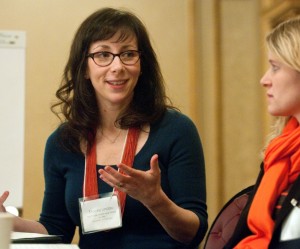
Professor Stacy Lindau, Pritzker School of Medicine, directs the South Side Health and Vitality Studies.
The workshop was the first of a series of interdisciplinary urban sciences workshops that UrbanCCD is supporting through a $600,000 grant from the U.S. National Science Foundation to create the Urban Sciences Research Coordination Network (USRCN). USRCN unites social, economic, health and computational scientists to develop a research roadmap for data-driven urban sciences.
USRCN will engage collaborators internationally, with an initial team from the Computation Institute, the University of Chicago Medical Center, Chapin Hall, the School of the Art Institute of Chicago, the City of Chicago, and the Chicago-based international architecture firm Skidmore, Owings & Merrill.
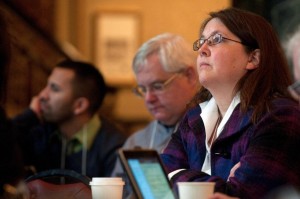
Anna-Maria Marshall (UIUC) teaches sociology of law and social movements, with a focus on gender and society.
For more information, visit the UrbanCCD website.

